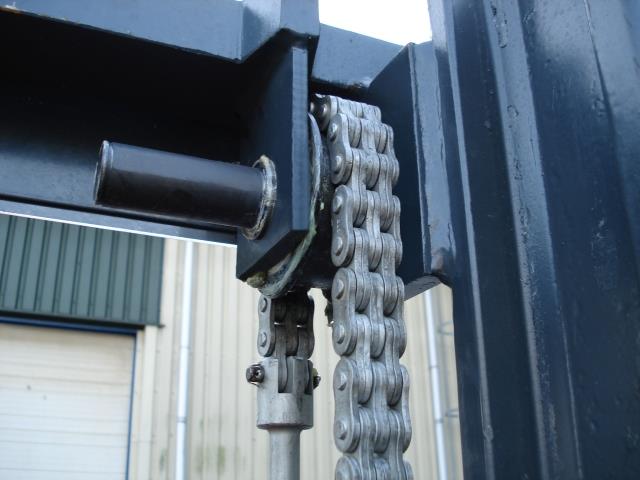 Click for larger image |
If the leaf chain that controls a lift truck mast's hydraulic functions breaks while in use, the repercussions for the truck owner are likely to be serious. Apart from the inevitable damage to the load and the front end of the truck itself, the forklift owner could face a personal injury compensation claim from any employee hurt as a result of chain malfunction. Such claims can run to many thousands of pounds.Of course, all forklift chains should be routinely checked for wear, and when the time comes for a chain to be replaced (most lift trucks chains last between three and five years) it is critically important to specify a product with a safe working load in excess of the lifting capacity of the truck it is fitted to.
For example, a counterbalanced truck with a load capacity of two tonnes should always be fitted with a chain that offers a working load of two tonnes or above - this is often shared between two chains.
To ensure that a replacement forklift chain is up to the job, truck users are advised to check the Chain Test Certificate which should be issued by the chain supplier - or lift truck dealer - when the replacement chain is acquired.
The Chain Test Certificate should show full details of the chain's minimum breaking load and proof load applied - a test to demonstrate that the chain is capable of supporting at least twice its safe working load weight.
"Replacement lift truck chain has to match or exceed the braking load of the original chain," says Peter Church, managing director of Letchworth-based leaf chain manufacturer,
FB Chain.
However, ensuring that a replacement lift truck chain matches the specification of the original can sometimes be less than straightforward.
This is because, since the introduction of the CE Marking scheme and the Machinery Directive in the 1990s, lift truck manufacturers truck have not been obliged to issue Chain Test Certificates when they sell a new forklift: the CE mark covers all working parts of the truck - including the chain.
AS a result, the type and strength of chain needed to replace a worn or damaged original component, is often unclear.
FB Chain operate an extensive database that helps truck users and forklift suppliers identify the correct replacement chain. The database is a log of various forklift models built over the last 25 years - and the type of chain they were fitted with when they left the factory.
Even in cases when the original chain was not an FB product, the company can usually advise on the most appropriate replacement.
For example, when Leighton Buzzard-based
Bulmor Lancer, who produce a range of sideloaders and other all terrain forklifts, were asked to provide a chain certificate for a truck they had supplied some years previously, they found they were unable to track the relevant documentation.
"Our client's truck was undergoing its annual Thorough Examination check and the examiner wanted to see the chain test certificate," explains Bulmor Lancer's managing director, Russell George.
He adds: "FB Chain were able to trace the chain type fitted to the truck and give details of its braking load. We were then able to issue a Chain Test Certificate with the peace of mind of knowing that the information stated was correct."
www.fbchain.comFor More information please contact:
FB Chain Ltd.Jubilee Road, Letchworth Garden City, SG6 1NE, England
Telephone: +44(0)1462 670844
Fax: +44(0)1462 480745
Email:
sales@fbchain.com Web:
www.fbchain.comAbout FB Chain:
FB Chain is the UK subsidiary of Addtech AB , a Swedish company listed on the Stockholm stock exchange. From its factory located in Letchworth, England, FB Chain specialises in leaf chain and associated products for the mechanical handling industry. FB is now the foremost supplier for this package of products in the UK and Ireland. In addition to leaf chain and machined products FB Chain's extensive stock product range includes roller chain, conveyor chain, sawmill or sharp top chain, as well as anchor bolts, anchor pins, pulleys and other special components.